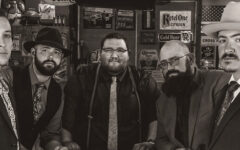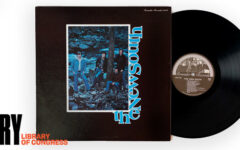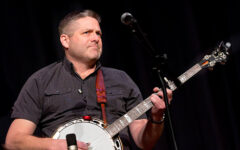 Living here in southwestern Virginia, the musical legacy of the Lost & Found is almost a palpable entity in the bluegrass community. Their 35 year career has influenced players, songwriters and performers worldwide, but their impact on the vibrant bluegrass scene near their home base in Ferrum, VA is especially deep and profound.
Living here in southwestern Virginia, the musical legacy of the Lost & Found is almost a palpable entity in the bluegrass community. Their 35 year career has influenced players, songwriters and performers worldwide, but their impact on the vibrant bluegrass scene near their home base in Ferrum, VA is especially deep and profound.
Many contemporary bluegrass fans think first of Lonesome River Band when southwest Virginia is mentioned, and rightly so. But before there was LRB, Lost & Found was schooling future Lonesome River boys in how distinctive, original bluegrass music was played. Sammy Shelor has long claimed original L&F banjoist Gene Parker was a primary mentor, and Ronnie Bowman spent time as a guitarist and lead singer with them before joining Lonesome River.
Lost & Found saw their greatest popularity in the 1980s, touring throughout the United States and turning out popular recordings along the way. The band launched in 1973 with Allen Mills on bass, Dempsey Young on mandolin, Roger Handy on guitar and Gene Parker on banjo. Over the years, a number of banjo pickers and guitarists/vocalists have come through the band, but Mills and Young managed to retain the band’s trademark style – a relaxed, easygoing sound with sparse accompaniment on simple, plainspoken songs, presented with wit and enthusiasm on stage.
Their new Rebel release, Love, Lost and Found, shows what a 35 year dedication to quality music and an enduring style can produce. It includes a number of songs that will be familiar to long time fans – staples of their live shows – and one reworked song from their debut 1975 album. It also serves as a testament to the artistry of Dempsey Young, who passed away in 2006, while this project was being recorded. He is featured on mandolin and vocals, along with Scott Napier, who has stepped into Young’s large and very impressive shoes.
Let me get the superlatives out of the way… This is a fabulous recording, one I can heartily recommend to anyone who appreciates bluegrass music. The song choices are universally strong, the performances spot on, and the elusive “feel” just right. It may not end up having the influence and impact of their groundbreaking early records, but it strikes me as their most polished and thoroughly satisfying album yet.
I spoke with Mills about the new CD, and he deflected all the praise for the way it turned out to his current band – Scottie Sparks on guitar and lead vocals, Ronald Smith and banjo, and Napier on mandolin.
“I can’t say enough about these guys who let me play with them. Their commitment to the sound that Gene and Dempsey and I started so long ago is humbling. These guys can play any way they want, and I don’t have to ask them to play a certain way.
There ain’t no hot dogs in our group – each man is an individual. I’m so thankful and so proud of these guys.”
I also asked Allen about the band’s approach to accompaniment, where you could always hear the rhythm section, but where the musicians were clearly supporting the singer and the song, as opposed to “playing their backup.”
“This is from my years of listening to country music… don’t try to cover up the singer or play over him. Flatt & Scruggs might have a little fill line hear and there, but you could always hear the singer and understand the words.”
You can hear that – and the other defining elements of the band’s understated, even casual, approach – on Letter Stained In Blue, sung by Scottie Sparks. It is played with the definitive “slow groove” that has marked their sound from the very start.
Letter Stained In Blue – Listen now: [http://media.libsyn.com/media/thegrasscast/letter_stained_in_blue.mp3]
“There very easily could have been harmony on these choruses, and it would have sounded just fine. But I told the guys that Scottie did such a great job singing it, that we should leave it alone and make it a song that he owns. It lets him be not so much a sideman but a strong lead singer in his own right.
Scottie Sparks ought to be labeled Kentucky Soul.
This song was written by Dan Wells, who plays in a band called Constant Change down in Raleigh, NC. He’s a great writer, and dynamic singer who worked with James King.
Dan’s like an old man in his mid twenties. He writes about old things and old thoughts. He sent us a CD with a number of his songs and we listened to it in the bus after we got it, and me and Scottie both took a copy home.
After a month or so, we agreed that it was full of great songs, and we have several of them on the new CD.”
One of the most poignant tracks is the one that Dempsey Young sings, A Daisy A Day. Hearing his voice on a new CD is disconcerting, and the subject matter of the song makes it seem almost prescient that he had started, but not finished his work on this track when he passed.
A Daisy A Day – Listen now: [http://media.libsyn.com/media/thegrasscast/daisy_a_day.mp3]
“Dempsey had been doing that song with us for years, and every time he did it he got a standing ovation. We cut this with Roger years ago, and I had talked Dempsey into doing it for this record.
He cut the mandolin and scratch vocal together, and even though he always liked to overdub his vocals, we decided to keep it because there is a lot of emotion in his singing. It wouldn’t have been fair to his legacy and his fans to have left it off.
You don’t erase out 33 years of playing together, and I don’t want to. I’m so pleased to have seen an icon like that evolve and grow.
Of course Mills’ own recognizable voice is the central element that has been a constant through this 35 years of the Lost & Found, and he has a number of memorable tracks here as well. One standout is a Waltz Medley that blends the Tennessee, Kentucky and Shenandoah waltzes in a nearly five minute marathon – where an uninitiated listener can come to understand why Dempsey Young is so highly regarded as a mandolinist.
“We had recorded a medley of old country songs on Ride Through The Country, and we came up with this medley from playing club dates years ago, trying to keep a song going if there was a couple dancing in the corner.
I was inspired a lot by Clyde Moody, being in the Danville area when he was there in the 50s, and I heard him sing Shenandoah Waltz many times, and Jim Eanes as well. Of course I heard Bill Monroe sing Kentucky Waltz all the time, and I loved Pee Wee King doing Tennessee Waltz.”
Mills also has two of his own compositions on Love, Lost and Found, one of which appeared on their very first LP record on Outlet Records.
If Today Was The Last Day – Listen now: [http://media.libsyn.com/media/thegrasscast/if_today_was_the_last.mp3]
“That was on our first album back in 1975 in the key of D, and I sang high baritone on the choruses. Not long ago, Gene Parker said that I should sing it in G, and start doing it again.
When we got to rehearsing for this record, I asked Scottie if he could tenor to it, and he said ‘I might have to bow up, but I can do it.’ He did a great job, and Ronald’s baritone fit right in.
A friend of ours, Alfred Hatfield always asked for this song when we would see him in Summersville. He had a heart attack and died last year, and never got to hear it. So this one’s really for him.”
You can hear several complete tracks from the new CD on the band’s MySpace page, and samples from all 13 tracks in iTunes.
Allen Mills was a founding member of the International Bluegrass Music Association, being on hand for the first meetings of industry folks in 1985 when the organization was being discussed. Despite their 35 years in our business, and their ongoing contribution to the music, neither the band nor any of their recordings have been recognized in the IBMA Awards.
Bluegrass Today isn’t inclined to start or lead a campaign, but we will say that if any voting members of the IBMA fill out their 2009 awards ballot without a careful listening to Love, Lost and Found, they will have done a grave disservice to an important part of our music’s heritage, and a record worthy of recognition of its own accord.







